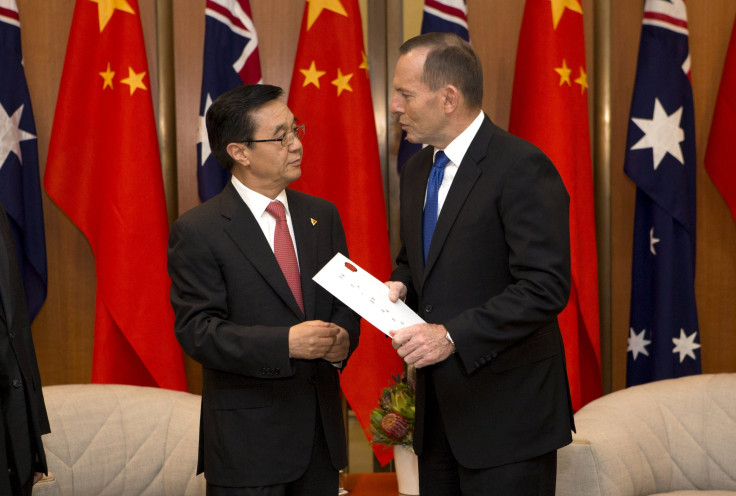China Signs 'Most Liberal' Free Trade Accord With Australia, Expected To Boost Australian Exports And Chinese Investment

SHANGHAI -- China and Australia have signed a landmark free trade agreement, which China's commerce minister described as the most liberal trade accord Beijing has ever agreed to with another country. Australian Prime Minister Tony Abbott said at a signing ceremony in Canberra on Wednesday that the “unprecedented agreement” would boost both trade and investment between the two countries.
The accord, which follows both countries’ conclusion of free trade accords with other Asia-Pacific neighbors, including South Korea, is seen as a sign of both governments’ determination to harness the potential of regional trade in the face of global economic slowdown.
The deal, when ratified, will cut tariffs on more than 85 percent of Australian exports to China, many drastically -- and will eventually cover 95 percent of the nation’s goods and services. It will also allow Chinese manufacturers to take a potentially larger stake of the Australian market, removing existing tariffs on Chinese household goods and home electronics. One Australian report predicted it could lead to a household “spending frenzy.”
The accord also allows for up to 5,000 Chinese citizens a year to get "working holiday" visas for Australia -- something Australian unions have warned could lead to an influx of cheap labor. A recent poll also showed that 70 percent of Australians thought it was too easy for Chinese people to invest in real estate in the country, according to the Australian Associated Press (AAP).
However, Abbott said the accord was “proof of Australia’s trust” in China. He said it would “change our countries for the better, …our region for the better, …our world for the better."
China’s Xinhua news agency emphasized that Australia was the second-largest destination for China’s overseas investment, and said the agreement would "facilitate the flow of capital, resources and people and benefit industries and consumers in both countries.”
AAP reported that China’s commerce minister Gao Hucheng had explained the merits of the deal to President Xi Jinping by saying that China would get “more beef and better wine.” Australia’s dairy industry is also expected to see a rise in exports -- with trust in China’s domestic dairy products still damaged by a health scandal involving sales of adulterated milk in 2008.
Australia’s mining sector, for which China is a major market, also praised the deal as a "watershed," while Trade Minister Andrew Robb was quoted as saying that the agreement would help Australia’s high-end manufacturers to import parts more cheaply.
The accord follows other Australian deals with South Korea and Japan, which form a major plank of the Abbott government’s economic strategy. Research by the Australian government-backed Centre for International Economics found that the three accords would create almost 180,000 jobs in Australia in the next two decades, and would add 0.1 percent to the country’s GDP. Exports to North Asia would grow by more than $15 billion over the next 20 years, a rise of over 1 percent, it said, while imports would rise 8.3 percent.
China is Australia’s biggest trading partner and largest export market, with Australia exporting goods and services worth $136 billion last year, according to Chinese data. Australia has also invested about $44 billion in China.
Huang Wei of the Chinese Academy of Social Sciences said the accord showed that China was “steadily pushing forward its free trade agreements in the Asia-Pacific Region," China's Global Times newspaper reported.
China has previously signed free trade agreements with regional countries, including New Zealand and Singapore -- as well as Chile, Switzerland and Iceland. Analysts say the deals with increasingly large economies -- such as South Korea, with which it signed a deal on June 1, and Australia -- are a sign of Beijing’s growing willingness to open its economy to international trade and competition, as the government seeks to stimulate domestic consumption amid slowing economic growth.
Some observers say the accords could also help Beijing to add to its global "soft power." The Global Times newspaper also made the point that this month's accords on new free trade agreements had been signed as U.S. President Barack Obama’s attempt to pass his own regional free trade plan, the Trans-Pacific Partnership, “stutter[ed]” in Congress.
© Copyright IBTimes 2024. All rights reserved.





















